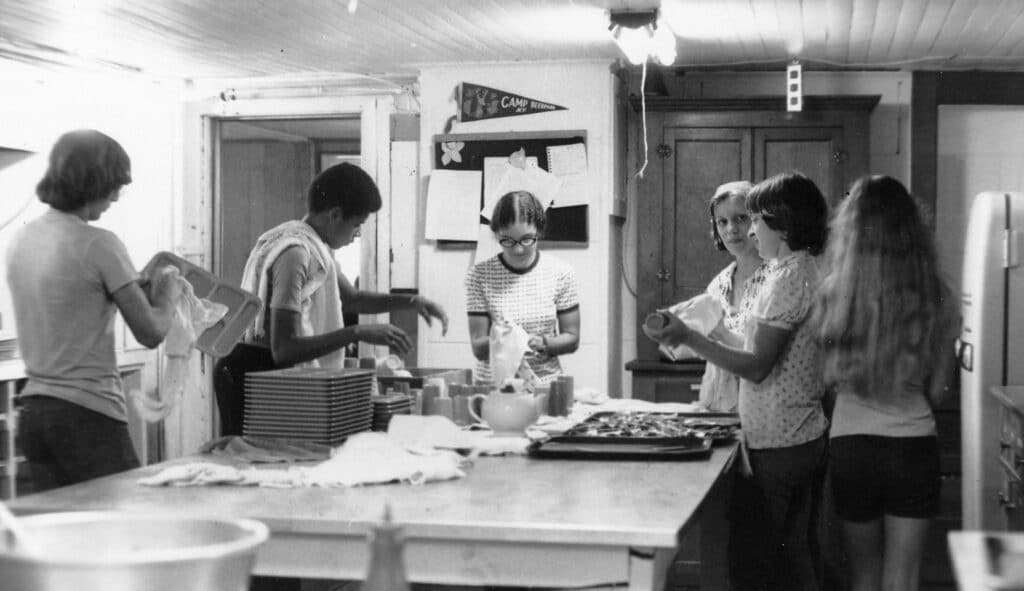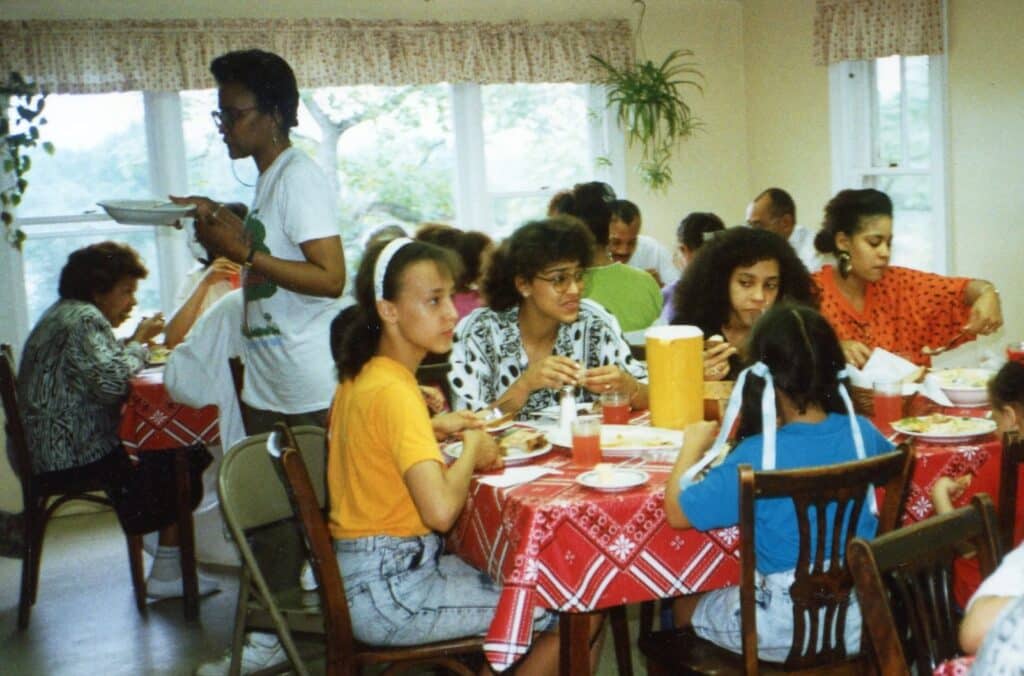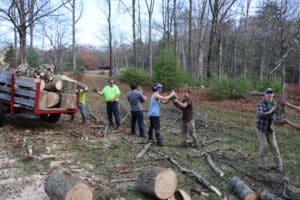In the Kitchen
“My first impression of camp was that it seemed huge and like a lot of work,” said Doris Stoltzfus, who was the head cook for the first two years of camp. “Just to look at it seemed a bit overwhelming.”
“We cleaned and cleaned to get the facilities ready to open for the first event at camp—not just the kitchen but the bedrooms, bathrooms and living room area as well. I had to learn to clean really fast. For every retreat we had to set the dining room, clean dishes, sweep, empty garbage cans, vacuum, everything. We would drive up to camp on a Friday after the kids were out of school. That first year Duane was 9; Donna, 7; and Deb was only 2. Dale and I would clean before the group arrived that evening, have a snack ready for them, and then clean on Sunday after they left.
”When Camp Deerpark opened, no one lived at the camp year round. Dale said, “We’d come up on the weekends for retreats, and spend the summers there. The first weekend retreat took place only two weeks after camp was purchased and the youth group was the first group to come. It was Memorial Day weekend and there were about 70 youth from about seven Mennonite churches in New York City.
”The previous business at camp—Brandt’s Pleasant View—had operated a resort that mainly served a German clientele from New York City. It advertised, “Delicious home-cooked meals, family style.” “The kitchen had everything we needed,” Dale said. “From serving dishes to a large, walk-in refrigerator, it was ready to go.”
“All of a sudden I needed to become a cook for a large group,” Doris said. “I didn’t know what I was doing. There was a lot of commercial equipment in the kitchen that I had to learn to use, like the mixers, the oven, the dish-washer, etc. John and Mim Buckwalter came along the first weekend to help us. Mim helped me in the kitchen.”
Mim said, “I remember that it was a lot of hard work, but that it felt like a new adventure. That first weekend I also remember feeling like I didn’t know what I was doing, but I didn’t have full responsibility so it wasn’t as stressful for me as it was for Doris.”

“The first lunch I made—the Saturday noon meal—was a total flop. I didn’t like it myself,” said Doris. “I was mortified. A man who attended Good Shepherd Mennonite Church and worked at Shea Stadium convinced me to buy frozen pizzas like they served at the stadium. He said they would make an easy meal. He was trying to be helpful and I didn’t know what to make, so I agreed. But these kids were from the city and they knew what good pizza was. The kids hardly ate any of the pizza we served, which was a bit tough. After that we just jumped in and began to cook. The rest of the meals were fine, I believe. The kids seemed to appreciate the home-cooked meals. I think for supper on Saturday we made roast beef and mashed potatoes.”
“I don’t even remember the frozen pizza,” said Mim. “I helped cook on various weekends, and Doris always had a lot of good meals and good ideas in the kitchen. I do have a memory similar to hers though. One time I made a lime Jell-O salad with cottage cheese. It was a popular Pennsylvania Dutch dish. But the kids looked at it and said, ‘I’m not eating that swamp juice.’ They didn’t like that it was green with cheese in it. I was a bit embarrassed. I don’t know what we did with all of that left-over Jell-O salad.”
During the first couple of years of camp Dale helped in the kitchen and did the food shopping. “When I cooked for retreats and for children’s summer camps,” Doris recalled, “Dale would go into Port Jervis to shop at the grocery store. Sometimes I would plan a meal, but if an item was too expensive, he wouldn’t get it. I’d be waiting for my ingredients back at camp and that would really throw me.”
“Well, we didn’t have a budget,” said Dale. “We had very little money and were worried about being able to pay the mortgage. The first year we weren’t registered to receive government food or buy wholesale. So I had to go into town and buy a lot of stuff off shelves to get going. I remember going to Artie’s meat shop between Port Jervis and camp on 209. One time I was filling up a cart with cans of food and I was emptying out some of the shelves of certain items. Duane was along and he remembers the owner getting upset and asking us, ‘What do you think you’re doing, taking all of the cans?’ I usually went to a larger grocery store in Port Jervis. I’d load up a couple of carts, pay, carry the groceries to the car and go in and do it again. I bought fruit cocktail by the gallon. It was a guessing game in terms of quantity and how much to buy. We never knew how many people would show up for retreats. They didn’t always register.
”During the second summer, camp received surplus food from the government. Doris said, “We were given large cans of peanut butter and pudding, bags of rice and huge chunks of cheese and some other items. Onetime Camp Hebron gave us boxes and boxes of granola. You had to be creative to use what was given, and not serve the same meals all of the time. Once we were given many gallons of rum raisin ice cream. You couldn’t disguise that. And it was hard spreading the surplus peanut butter on bread without the bread tearing, so we mixed grape jelly with the peanut butter. The combination became a favorite of the kids. We went through a lot of the peanut butter and jelly spread.”
“One of the favorite meals the kids always enjoyed was roast beef and mashed potatoes,” Doris continued. “Just the aroma when we were cooking would invite positive comments. They also liked a meal which Dale helped make which was meatloaf and baked potatoes. A couple of times each summer Dale’s parents would bring corn on the cob and fresh tomatoes from Pennsylvania. Dale’s mom would sit outside and husk ears and ears of corn. The kids loved the sweet corn and were grateful. It made Dale’s parents feel really good to contribute in that way.”
“We served the meals family style,” Dale said. “During summer camps, the kids would sit with their counselor and we would bring the food to the tables. It was a time for the counselors and campers to pray and be thankful for the food being served, and have time to share together.”
“I had to learn how to be efficient in serving,” Doris added. “Having things ready when people came in to the dining room, and keeping the food warm. And I often had to work while holding Deb. People would want to watch her and would fuss over her, but she didn’t always like the attention. Sometimes it would make her cry and clingy, so I would work while holding her.”
After two years in which Doris served as the head cook, Esther Petersheim was hired to be in charge in the kitchen during summer camps. “I was very relieved not to be in charge any longer,” Doris said. “I still helped, but didn’t have to run the kitchen. It took a lot of pressure off of me. One of Esther’s popular meals was cornbread and chili.”
“Learning to know and appreciate people from a variety of cultural backgrounds was a special privilege for us,” Doris added. “It gave us a broader perspective on world issues and forced us to confront and challenge some of our own assumptions and beliefs. Fifty-plus years later we still cherish many friendships formed at Camp Deerpark.”
—Written by Donna Stoltzfus, former camper and staff.
Doris Stoltzfus, first head cook at camp, attended Glad Tidings Mennonite Church in the Bronx.
Dale Stoltzfus, first director of camp, attended Glad Tidings Mennonite Church in the Bronx.
Miriam Buckwalter, one of the first volunteers at camp, attended Good Shepherd Mennonite Church in the Bronx.
Related Entries
Share:
Come and Pray Lunch & Retreat
Come and PrayPrayer Day with Lunch March 14, 9am-3pm~$30~ Overnight Prayer RetreatMarch 13-14includes March 14 Lunch~$120~ Come seek the Lord’s face with your faith family from all over the Tristate region for a relaxing time of prayer and discussion. We know God is doing amazing things — and he will continue to do more as…
Time to Pray
As followers of Jesus, he is our example in everything. When Camp says in our mission statement that we are “a community of Christ” – this is what we’re saying: we’re a group of people dedicated to the purpose of following and being like Jesus. So the question is, how do we follow Jesus as…
A Place of Prayer
Prayer — especially “vertical prayer” for specific God-revealed mission set apart from the concerns of our life and ministry — is a major theme for Camp in 2026. Maybe you read about this in the Winter Newsletter article “Time to Pray“? We want to extend the invitation to the entire Camp community and beyond —…
Living Abundantly Retreat
Jesus promised his followers an abundant life. Is that just an abstract idea to distract us from earthly misery, or is there real power in Christ to live a full and rich life in the here and now? Young adults are navigating a challenging landscape as they start “adulting” and building a life, so we’ll…
Forgiving Debts: 2025 Woodcutting Season
When Jesus taught his disciples to pray (Mt 6:9-15), he described two big realities where “thy Kingdom Come, thy will be done on Earth as it is in Heaven” are realized in the human world: First, he said “give us this day our daily bread”, acknowledging that God’s provision for human need is a central…
“How Do I Donate?”
Recently, a thirteen-year-old guest at Camp asked Operations Director Kevin Smith, “how do I donate?” Kevin was honestly a little surprised, but was happy to see this young member – who was on retreat with one of our owning churches — taking some initiative. Kevin directed him to the website Donate page, and the young…
The Discipleship Down-Low
Defining Discipleship 18 And Jesus came and said to them, “All authority in heaven and on earth has been given to me. 19 Go therefore and make disciples of all nations, baptizing them in the name of the Father and of the Son and of the Holy Spirit, 20 teaching them to observe all that I have commanded…
The Virtuous Wife
This past weekend, Camp hosted three women’s retreats at Camp. Though the retreat groups were very diverse in background – one was from an urban church plant in Philadelphia, one was from a Garifuna Mennonite church in Brooklyn (an Afro-Caribbean Culture), and one was from a multi-ethnic faith community reaching out in North Jersey. Though…
A Life of Service
I believe the most important thing to God is not our personality, knowledge, or talents, but our availability. How willing and ready are we to respond when He calls, and how ready are we to do what He says? What use to the Lord are people who could do what he wants with excellence and…
Building Belonging
At our February NYC LMC District meeting, we’re discussing the Belonging phase of The Journey Map. In this first phase on the map, individuals and groups on a spiritual journey begin the process of connecting to each other and evaluating the place they may have in each other’s lives. Have you ever been an outsider…






